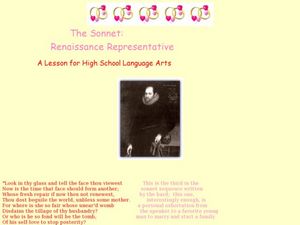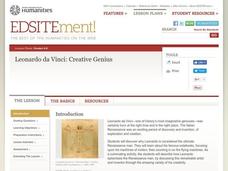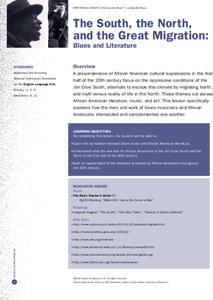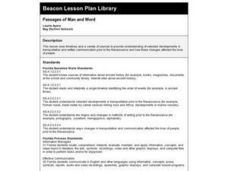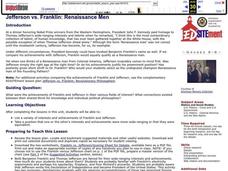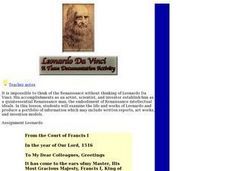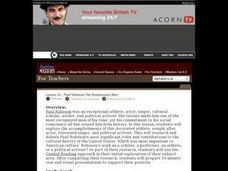Curated OER
Renaissance Man Comparison Poster
Students watch a PBS video entitled Suleiman to help them identify characteristics associated with Renaissance notables. After watching the video, individually or in small groups, the students will research a notable Renaissance figure...
Curated OER
The Renaissance, Background
Students are introduced to the Renaissance by viewing a PowerPoint presentation. For this Renaissance lesson, students locate the important countries and cities of the Renaissance. Students compare how it was in England from the rest of...
Curated OER
Harlem Renaissance
Students investigate the African American culture in the 1920's and the Harlem Renaissance. They read and analyze poems written by poets of the Harlem Renaissance, listen to jazz music and identify the characteristics of the music, and...
PBS
Shakespeare & The Renaissance: Activity Ideas
Looking for ways to implement the words and works of William Shakespeare into your curriculum? This list of activity ideas is a great starting point, as it covers a wide range of grade levels and a wealth of online references to explore.
Curated OER
Leonardo da Vinci: Creative Genius
Students discuss how Leonardo Da Vinci reflected the spirit of the Renaissance. They examine his achivements and explain the significance of his notebooks. They write essays on what constitutes a "rRenaissance man."
Curated OER
Social Studies: Renaissance
Learners explore Renaissance architecture. In this Renaissance lesson, students view a slideshow featuring architecture of the era and then discuss the math skills used to the build the structures. Student build their own replicas of...
Curated OER
The Sonnet: Renaissance Representative
Young scholars compose couplets, quatrains, and sonnets after learning about Italian and English sonnets. In this sonnets lesson plan, students read sonnets, analyze them, connect them to the Renaissance and present times, and then write...
Curated OER
Paul Robeson: 20th-Century Renaissance Man, Hero In Any Century
Students study the life and times of actor Paul Robeson. In this social activism lesson, students research primary and secondary documents to create multi-media presentations featuring Paul Robeson's life and political activism.
Curated OER
Leonardo da Vinci: Creative Genius
Students examine how Leonardo da Vinci exemplified the Renaissance period. They explore various websites, conduct Internet research, complete a chart, explore virtual da Vinci notebooks, and write an essay.
Curated OER
The South, the North and the Great Migration: Blues and Literature
Here is a complex lesson plan that interweaves the history of the Jim Crow South and the Great Migration with the study of poetry, art, and blues music from the Harlem Renaissance. The plan helps young historians develop a deep...
Curated OER
The Renaissance Person: composing an Extended Definition Essay
Students recognize the characteristics of an extended definition. In this Renaissance person lesson, students read a collection of short stories. Students research the definitions of Renaissance and Renaissance person. ...
Curated OER
Italian Renaissance
Fifth graders explore the Italian Rensissance in this six lessons unit. The prominent citizens, the ideas, values, art, philosophy, and literature of the are seen as a rediscovery of Ancient Greek and Roman times.
Curated OER
Paul Robeson: 20th-Century Renaissance Man, Hero In Any Century
Learners explore several themes relevant to the life of Paul Robeson and the social, artistic, & political realities of the first half of the 20th century, identify and interview heroes in their communities, and publish profiles on...
Curated OER
Passages of Man and Word
Third graders explore transportation and written communication prior to the Renaissance.
Curated OER
What a Square
Students examine the painting "Old Man With A Gold Chain" by Rembrandt. They identify geometric shapes in the painting, measure these shapes and compare the relationships of these measurements.
Curated OER
Michelangelo: Artist and Man
Students are introduced to Michelangelo in this A&E influenced activity.
Curated OER
The Magnificent Medici
Students watch a video about the internal power struggles of the Medici family of Renaissance Italy. They compare the Medici family to the Mafia and produce a written response to the film.
Curated OER
Spiritual Space
Students explore Italian Renaissance artwork. In this visual arts lesson plan, students examine "Madonna, Saint Thomas Aquinas, and Saint Paul'" by Bernardo Daddi. Students investigate the use of space, scale, and proportion in the work...
Curated OER
Jefferson vs. Franklin: Renaissance Men
Learners investigate the achievements of Benjamin Franklin and Thomas Jefferson. They conduct Internet research, identify their achievements, and participate in a 'competition' that compares/contrasts the two men.
Curated OER
Leonardo Da Vinci A Team Doncumentation Activity
Students examine the life and works of Leonardo and produce a portfolio of information which may include written reports, art works, and invention models.
Curated OER
Thomas Jefferson: Philosopher of Freedom
Pupils view a documentary on Thomas Jefferson. Statesman, scientist, architect, president-he was America's dashing Renaissance man. After viewing, students discuss what they saw then write their own version of a biography of Thomas...
Curated OER
Art and Anatomy: The Vitruvian Teen
Twelfth graders create an artistic version of a Vetruvian teen. In this anatomy lesson, 12th graders design an experiment to test the theory of the ideally proportioned man. They present their findings in class.
Curated OER
Paul Robeson: The Renaissance Man
Students research the life of athlete, actor, singer, cultural scholar, author, and political activist, Paul Robeson. They answer the question, "Which was most important to American culture -Robeson's work as a scholar, a performer, an...
Curated OER
Jefferson vs. Franklin: Renaissance Men
Students list a variety of interests and achievements of Franklin and Jefferson. They take a position that one or the other's interests and achievements were more wide-ranging or that they were equivalent. They write out their findings.








